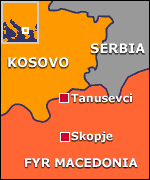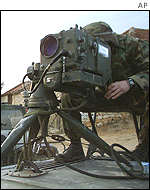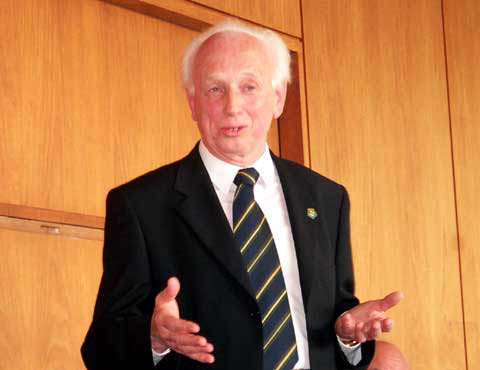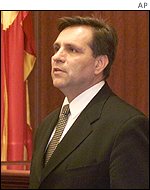Enter content here US troops in Kosovo border clash. US troops are stepping up controls near the border. US troops have shot and wounded two rebel fighters in Kosovo, near the increasingly tense border with Macedonia.
The incident happened not far from the Macedonian village of Tanusevci - the focus of cross-border unrest involving ethnic Albanian rebels. Macedonian sources say the gunmen were trying to reinforce rebel positions in the village.
The BBC's Paul Wood says the clash is a very serious development for K-For, and raises the possibility that Nato troops could be sucked into combating the ethnic Albanian insurgency in Macedonia.
The growing insecurity in the region was also highlighted by a landmine explosion on the edge of the buffer zone between Kosovo and Serbia, which killed two Yugoslav soldiers and seriously injured two others.  Provocation
The shooting came only hours after Nato revealed that Yugoslav troops might be asked to help police the demilitarised zone around Kosovo, to deter attacks on Macedonia.
Nato's proposal has provoked a strong reaction from Kosovo Albanian leaders, who said it could spark fresh violence in the Balkans.
Kole Berisha, vice-president of the Democratic League of Kosovo Party, said they could not trust an army which until recently committed massacres in Kosovo.
He said installing the Serbian-led Yugoslav army would be "a provocation, making possible an open conflict that would include the entire region."
But Yugoslavia's ambassador to London, Vladeta Yankovic, told the BBC the aim of the Yugoslav forces would be to protect existing borders.
"We are all facing [the rebels], Macedonians, Yugoslavs, Nato together," he said.
Military statement
The US troops involved in Wednesday's shooting were on patrol with Kosovo's Nato-led peacekeeping force, K-For, when they were threatened by armed men and opened fire, said a US military statement.
The incident happened only a few miles from Tanusevci, near the Kosovo village of Mijak.
Some of the gunmen fled across the border into Macedonia but others were held, including one injured man, said a US spokesman.
Fighters from the rebel National Liberation Army have told the BBC that if any of those arrested were to be extradited to Macedonia, the organisation would consider American K-For troops to be legitimate targets.
The border has grown increasingly tense amid warnings from Macedonia that ethnic Albanians pose a threat to the stability of the entire Balkans region.  The flashpoint village of Tanusevci is under K-For observation from Kosovo. Rebel goal
Three Macedonian soldiers have been killed in rebel attacks in the past week, and there have been reports of rebels digging in along the border.
The entire Macedonian border with Kosovo remains closed while the unrest continues.
Macedonia fears that it could be afflicted by the same kind of ethnic conflict that has devastated other former Yugoslav republics.
The rebels, who want to unite parts of Serbia and Macedonia where ethnic Albanians live, have attracted strong international condemnation.
"We are looking very closely now at the possible decision to allow Yugoslav forces into the ground safety zone," Nato Secretary General, Lord Robertson, said in New York.
He said Nato was determined that the area "will not be used as a safe haven for extremists to launch attacks".
The zone, five kilometres (three miles) wide and 300 km (180 miles) long, is particularly sensitive at its southern end near Macedonia, where areas around the Presevo Valley have seen some of the highest levels of activity by ethnic Albanians.  Hungary condemns Albanian terrorism. --- President of the Republic of Macedonia Boris Trajkovski received today a note from Hungarian President Madl Ferenc, who expresses his sincere condolences for the death of three Macedonian soldiers, who were killed Sunday by the extremists in the region near the Tanusevci village.
"The Republic of Hungary condemns all forms of terrorism and all actions that aim to prevent finding of a peaceful solution for the problem. We put the emphasis on the significance of Macedonia's territorial integrity and sovereignty and support all measures undertaken for security of the Macedonian citizens," reads the note.
"We highly appreciate the patience and wisdom that you, as leader of the country, are showing at these moments. I am convinced that the international community and NATO will offer active and efficient cooperation for resolving of the situation in northern Macedonia," The Hungarian president says in the note sent to President Trajkovski.
President Trajkovski postponed his first official visit to Hungary, planed for tomorrow. Eye-witness: Flashpoint village. BBC Villagers have fled to Kosovo to escape the fighting. By Balkans correspondent Paul Wood in Kosovo.
Cradling the baby she had carried across the snowy, heavily-mined border, Rufadije Jakupi told me how she had huddled in a cellar with her children during a three-hour bombardment by the Macedonian security forces.
An American officer later told me he thought the Macedonians had been using Katjusha rockets against Tanusevci, the village the women had fled.
"The Macedonian army behaves worse than the Serbs ever did in Kosovo," Rufadije told me at the house just inside Kosovo where she is staying with her five children and a group of about 30 other refugees.
Clashes erupted in Tanusevci - just inside Macedonia and overlooking the border with Kosovo - two weeks ago. Ethnic Albanian rebels still hold the village, but are surrounded by the Macedonian security forces.
There are several explanations as to why the fighting should have started now, and why it should be in Tanusevci.
I first went to the village almost two years ago. They told me then it would be Macedonia's Prekaz - referring to the place where the ethnic Albanian rebellion began in Kosovo - and events could yet bear out their prediction.
Many Albanians from Tanusevci joined the Kosovo Liberation Army - even though they were Macedonian citizens. It is these men who today form the core of the new group fighting in Macedonia, the National Liberation Army, or NLA.
Hostility
Tanusevci, with a population of about 800, is completely ethnic Albanian. The Macedonian police and army, who are mainly drawn from the republic's Slav Orthodox population, were never welcome there and the village has often seemed on the edge of violence.
Local people say these current clashes began when the security forces shot dead a 22-year-old ethnic Albanian farmer as he planted his potatoes.
To the villagers and fighters of the NLA, this is a long overdue war of self-defence which started because one day the Macedonian security forces went too far.
This version of events is vigorously denied by the authorities. They point out that three Macedonian soldiers have been killed on the border in recent days.
The authorities say that what is happening is an attempt by ethnic Albanians fighting in Serbia's Presevo Valley to destabilise the whole region by spreading the violence into Macedonia.
What is described as an occupation of Tanusevci by terrorists is seen in Skopje as the result of dissatisfaction, on the part of ethnic Albanians in southern Serbia, with the border demarcation agreement signed by Macedonia and Yugoslavia just a few weeks ago.
'Problem from Kosovo'
The official line in Skopje is that the NLA is a problem from Kosovo, not a Macedonian-based organisation. I have spoken to members of the NLA, and they say this is precisely what they are and they intend widening their campaign to all the ethnic Albanian areas of Macedonia.
As with the war in Kosovo, a battle for territory is being presented to the West as simply a struggle for human rights. The unstated aim is for all ethnic Albanians, from southern Serbia, through Kosovo and Macedonia to Albania itself, to be able to live in one state: "Greater Albania".
The rebels do not have international support for this and the outside world is backing the Macedonian government in its efforts to maintain stability in the republic.  President Trajkovski: no negotiations with 'terrorists' In a dramatic and hard-hitting speech to parliament, the Macedonian President, Boris Trajkovski, said he would not give up one single metre of the republic's territory to "extremists and terrorists". "We will not negotiate with terrorist, militarist elements who spread racial and ethnic hatred," he added.
One view is that the Macedonian Government is deliberately playing down the origins of the NLA, not wanting to lend them credibility by giving the organisation a name and status.
Others have put forward a rather Balkan conspiracy theory, which is that the Macedonian Government provoked the clashes in Tanusevci because it needed a crisis to distract attention from a burgeoning bugging and telephone-tapping scandal at home.
There is no evidence for this, or for another story, which is that the fighting began as a dispute between ethnic Albanian and Macedonian Mafia gangs over the division of profits from the smuggling of cigarettes. Three Macedonian soldiers died in recent border clashes. Macedonia's Albanians
Macedonia does have a multi-ethnic government which includes an ethnic Albanian party.
"They [the NLA] have not found support from any Albanian political structures, starting from the government of Albania to the smallest political parties," said Menduh Thaci, deputy leader of the Democratic Party of Albanians, the biggest Albanian political party in Macedonia.
This may be true - but in Kosovo, the Kosovo Liberation Army did not have support from the biggest ethnic Albanian political party.
There are nevertheless worrying signs that the violence in Macedonian may be escalating.
So far, the country has remained untouched by the ethnic conflict which devastated other former Yugoslav republics. But people there are now asking if they will be next. |



